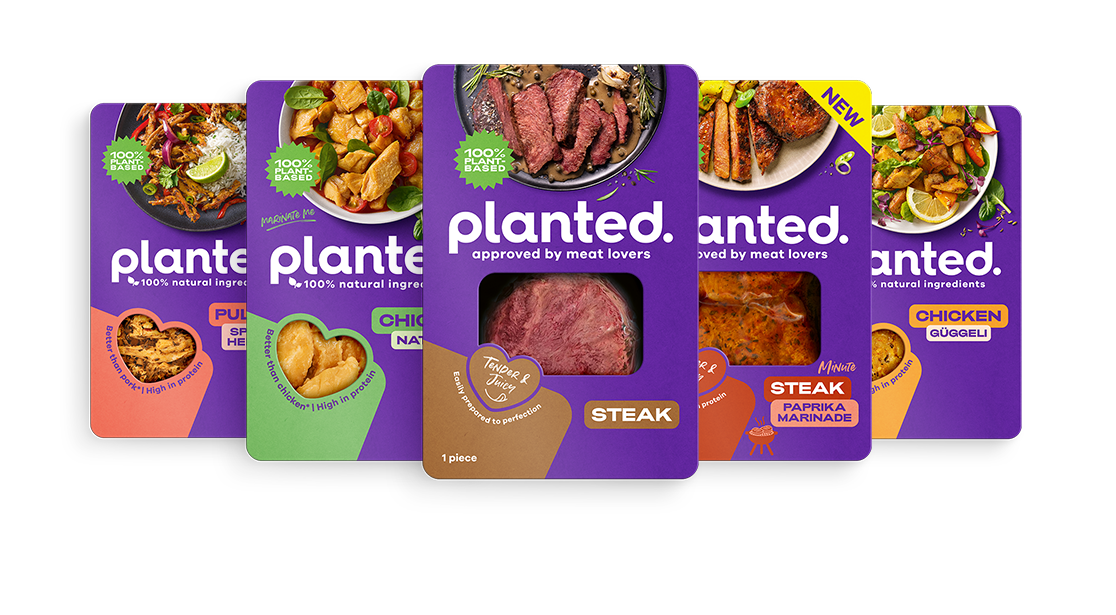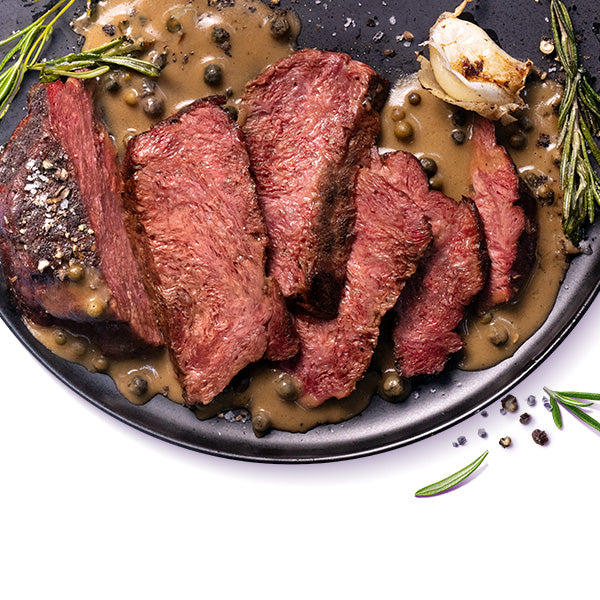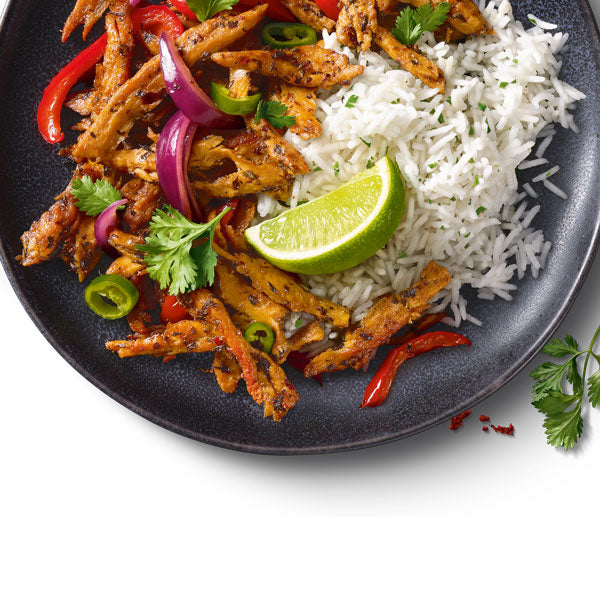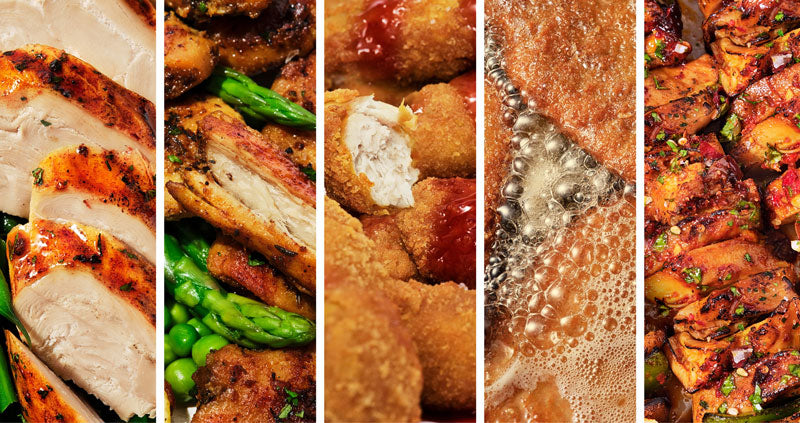FAQ's
General
-
Where are Planted products manufactured?
Planted produces its meat in Kemptthal (Switzerland) and Memmingen (Germany). You can find more information on how our products are made under: Production -
Where can I buy Planted?
You can find our Planted meat at various retailers, online stores and in numerous restaurants throughout Europe. You can find an overview of all locations on our website at Locations
The following online stores offer our products:
Switzerland: Farmy, Mrvegan, Alfies, fabulous.ch
Germany: kokku, Knuspr, Flink, HelloFresh
Austria: kokku, Gurkerl
Italy: kokku, Cortilia
France: kokku, vegetalfood, OfficialVeganShop
BeNeLux: kokku -
How do I prepare Planted correctly?
Our planted meat tastes wonderful in many variations and is easy to prepare. The easiest way is to follow the preparation instructions on the packaging. You can find lots of tips and tricks and delicious recipes under: Recipes -
Why does Planted look like animal meat and why do you name your products after animal products?
As we all know, we humans are creatures of habit, and food is not only a means of nourishment, but also part of our cultural and social heritage as well as a pleasure. However, in order to slow down climate change, our consumption of animal products must change drastically. The best way to achieve this as quickly as possible is with a product similar to animal meat that can be easily integrated into existing eating habits. To promote the transition to a more sustainable food system and a more conscious diet, it is crucial that consumers know how to use new products like ours correctly and integrate them easily into their everyday lives. The animal names serve as a guide. -
What makes Planted different from other plant-based meats ?
Planted differs mainly in the following points:
- Own production in Switzerland (Kemptthal) and in Germany (Memmingen): We are very proud to be able to produce our meat in our own production facility. This gives us full control over the entire process and allows us to further optimize our meat.
- Short & natural ingredients list: We only use natural ingredients and proteins. Our planted.chicken , for example, has only 5 ingredients.
- No additives - no artificial flavors, no artificial colors, no artificial preservatives
- High protein content
- Our marinades only contain ingredients that you would find in a kitchen cupboard.
What sets us apart is the meaty bite and texture of our products and the fact that we only use a few natural ingredients (no additives). We want to radically change the way meat is perceived, produced and consumed and encourage a shift from eating animal proteins to eating plant proteins, so that meat eaters can make a sustainable, healthy and tasty choice for everyday life. -
How is Planted meat made?
A combination of extrusion and fermentation is used in the manufacture of our products.
Extrusion is a process that has been used in the food industry since the 1960s to produce snacks, cereals and pasta. The latest innovations in the field of extrusion are central to the second generation of plant-based meat products. They make it possible to transform plant proteins, which are spherical on a microscopic level, into the fibrous, elongated form of animal muscle fiber proteins.
By combining extrusion and traditional fermentation, Planted can produce larger pieces of plant-based meat that have a more complex texture and are both juicier and more tender. We can also fortify this plant-based meat with important micronutrients such as vitamin B12. Fermentation has a long tradition in food production and is used, for example, in the production of wine, beer, salami, tempeh and sauerkraut. Fermentation of the raw material using microbes such as yeast fungi or bacteria improves both the taste and texture of these foods and also increases their safety and nutritional value. We take an innovative approach and use a perfect process and high-quality ingredients to create products that taste great - with No additives.
-
Can Planted meat be frozen?
As the manufacturer, we do not recommend freezing Planted products, as this can lead to a possible loss of quality. For the best taste experience, we recommend storing the product according to the storage instructions on the packaging and preparing it according to the preparation instructions. You can find tips and tricks on how best to prepare Planted under Products -
Can Planted be reheated after preparation?
Yes, dishes containing our meat can generally be reheated. Depending on the storage and reheating method, sensory deviations may occur, such as loss of juiciness and texture.
It is generally recommended to check food and especially dishes before consumption to see if they have changed in smell, appearance or taste. Please note that food must be stored in the refrigerator at below 5°C after cooking and that you should always follow the storage instructions and best-before dates on the food packaging. -
What is the shelf life of Planted meat?
See best before date on the packaging. -
Is it possible to visit the Planted production facility?
In Kemptthal - yes - we have the first transparent meat production facility there and are happy to open our doors to curious and interested guests. We offer private planted.experiences for groups during the working week. You can find all information about our offer here.
Unfortunately, we are currently unable to offer guided tours of our production facility in Memmingen. The architecture is not designed to allow a different flow of visitors and of course we have to adhere to very strict hygiene regulations.
We'd love to hear from you!
Ingredients
-
What ingredients does Planted Meat consist of?
We take an innovative approach and use a perfect process and high quality ingredients to create products that taste great - No additives. With a minimum of natural ingredients, we set a completely new standard in the plant-based product category. Thanks to a variety of proteins, our products are healthy for the consumer and protect the environment.
All Planted meat products are 100% plant-based and made with only carefully selected natural ingredients:
- peas, sunflowers, soy
- rapeseed oil (sunflower oil for the planted.bratwurst)
- water
- vitamin B12
+ Marinade made from natural ingredients such as salt, sugar, spices, herbs, yeast, lemon juice or other oils)
The exact details of the respective ingredients and nutritional values can be found on the packaging or on our website under Products -
Are Planted products certified organic?
At the moment, our meat is not certified organic. Unfortunately, it is currently not possible to obtain organic plant protein raw materials in the quality and quantity that we would need for the production of our meat. However, we are constantly searching for and evaluating organic raw materials. -
Are Planted products vegan?
We can assure you that no animal has been touched in the production of our plant-based meat. Planted is 100% plant-based, vegan and made from natural ingredients. All our products are labeled with the V-Label. -
Are Planted products gluten-free?
Our breaded products, such as the planted.schnitzel Viennese style, the planted.chicken Crispy Strips and the planted.chicken Crispy Burger contain wheat flour. These products are therefore not gluten-free.
No gluten-containing ingredients or gluten as a binding agent are used in the production of the other products. However, due to the manufacturing process, it cannot be completely ruled out that gluten-containing ingredients come into contact with the product. For this reason, these products are labeled with a trace label. -
What are the nutritional values of Planted?
You can find the exact details of the nutritional values of the individual varieties under Products
-
Do your products contain GMOs?
Our raw materials are made from non-GMO plants. Our vitamin B12 is obtained through fermentation and contains no GMOs. -
Where does the Vitamin B12 used come from?
The vitamin B12 used is cyanocobalamin. This is produced biotechnologically (fermentation) and is GMO-free, vegan and therefore contains no animal products. It is added because it is not found in such high quantities in plant-based raw materials. The supply of VitB12 is essential for a functioning metabolism and plays a key role for the blood, the nervous system and the brain. -
Why is vitamin B12 added?
Vitamin B12 is added to our meat for purely nutritional reasons. It is generally not found in such high quantities in plant-based raw materials (such as peas and rapeseed oil). We want to produce a product that is also a complete meat in terms of macro and micronutrients.
The aim is to ensure that people who follow a completely vegan or vegetarian diet are not deficient in vitamin B12.
We'd love to hear from you!
Sustainability
-
Is Planted B Corp certified?
Yes, since September 2023 we are officially certified as a B Corporation and we are very proud of it! The B Corp certification is a testament to our unwavering commitment to making a positive impact on people and the planet. As a certified B Corp, we belong to a global community of companies that meet high standards of performance, transparency and accountability, creating a balance between profit and purpose. For more information on sustainability at Planted, click here: Sustainability -
How is the CO2 and water footprint of Planted products calculated?
For the carbon footprint, the entire life cycle of our products was evaluated. For this purpose, we work together with the independent institute Eaternity. They looked at our products from cradle to grave. From the cultivation and harvesting of ingredients to processing and transport, energy consumption in our production facility, storage and transport to stores, and disposal of packaging - everything was included. These calculations are particularly important for us because they show us the areas in which we can still improve and where we can best start to do so.
Sustainability
Eaternity -
How is biodiversity considered when selecting products?
The sustainable and local cultivation of our raw materials is very important to us. We use a variety of plant proteins in our products, thereby promoting diversity in the cultivation of plant proteins and enabling a balanced diet.
Pea proteins and plant fibers are Planted's main raw materials and make up the majority of our total sourced ingredients. Other protein sources include soy and sunflower. Most of our raw materials currently come from Europe.
All raw materials purchased are GMO-free and are not grown in biodiversity-rich rainforest areas. -
Is Planted more sustainable compared to animal products?
Yes, compared to conventional meat production, with Planted we emit up to 97% less greenhouse gases and use up to 90% less water. You can find more information about sustainability and the savings per product at Sustainability -
How does Planted consider the circular economy?
Where possible, we procure raw materials using a circular economy approach in order to be able to produce even more resource-efficiently. This allows us to make an even greater contribution to a sustainable global food system with our meat.
In order to reduce waste and emissions, material and energy cycles are closed wherever possible and by-product streams from other value chains are utilized. With our sunflower, for example, which is used in planted.pulled , we only use the press cake that remains after oil extraction and is an important by-product. Traditionally, this sunflower press cake is used as animal feed, as a component of fertilizers or as a substrate for biogas production.
In addition to these uses, the press cake has great potential for reuse as food due to its richness in essential macro- and micronutrients, containing both protein and fiber. This approach ensures that every part of the harvest is utilized and waste is minimized. -
Are the products produced in an environmentally friendly way?
We use electricity from 100% Swiss hydropower for our production in Kemptthal (Switzerland). To ensure that no energy is wasted, we recycle the heat generated in the production process and use it to heat our offices and other parts of the building.In this way, we have drastically reduced our natural gas consumption to just 20%, with the remaining 80% being covered by this energy recovery system.
The Memmingen production site is almost CO2-neutral, completely free of fossil fuels. Instead, we rely on well cooling, and heat is supplied via a sustainable and regionally oriented local heating network including a biomass heating plant in the neighboring industrial park.
In order to reduce water consumption as much as possible, we have implemented water-saving measures throughout the company.
Find out more about sustainability at Planted here: Sustainability -
How sustainable is the sourcing of raw materials?
In addition to quality and safety, we attach particular importance to identifying and avoiding social and environmental risks in our supply chain. Our supplier policy defines criteria for sustainable cooperation based on the ILO labor standards and the UN Guiding Principles on Business and Human Rights and describes the avoidance of environmental pollution. This policy is currently being passed on to our most important suppliers.
-
How sustainable is pea protein?
The cultivation of yellow peas has some ecological advantages. As a legume, they are able to fix nitrogen from the atmosphere with the help of soil bacteria. This leads to improved soil health and quality as the plant naturally returns nitrogen to the soil. After harvest, the peas are processed into nutrient-rich flour, focusing on an animal-meat-like nutritional composition with high protein and low carbohydrate content. The proteins are mostly sourced from Western European countries. With our production, unlike traditional meat production, we skip the animal in the value chain, meaning the peas that are grown can be used directly for further processing and are not still used to feed livestock. As a result, our value chain has lower water consumption, less land use, and lower greenhouse gas emissions. -
What does Planted do about food waste?
We believe in using scarce resources sparingly and responsibly. That is why we are continuously working to optimize our production processes and avoid waste wherever possible. For example, we have introduced a project that enables us to recycle scrap from our production. Such rejects occur when our machines are not yet fully heated or when parts of the meat do not meet quality standards, for example. With the new process, we have been able to reduce losses by more than 90% and thus take action against food waste. -
How are Planted raw materials transported?
All raw materials are transported in containers and trucks; we do not fly in the main raw materials by plane. -
Where do the figures from the comparison with animal products come from?
The comparison with animal products was carried out by the independent institute Eaternity. Using the example of planted.chicken , the footprint is compared with that of a conventionally reared Swiss chicken (breast). The figures are compared on a cradle-to-gate basis for the planted.chicken with those of the animal chicken - i.e. from production until the finished product leaves the factory.
Sustainability -
What is the packaging made of?
In retail, we have switched our packaging in Switzerland to 80% recycled PET (rPET) and continue to use FSC/PEFC-certified cardboard. The rPET material has a lower carbon footprint - 66% more efficient in reducing environmental impact - than its virgin plastic counterpart and has already been recycled at least once. The FSC/PEFC certificate guarantees that the material used comes from managed forests. Our cardboard packaging can be disposed of in the normal cardboard collection. -
Where are the ingredients sourced from?
The local cultivation of our raw materials is very important to us.Most of our raw materials currently come from Europe. Whenever possible, we try to source raw materials from Switzerland and work closely with Swiss suppliers.
We are also currently part of the European research project HealthFerm, which is investigating innovative food fermentations based on pulses and cereals as well as the health effects and consumer perception of novel fermented foods.
More detailed information about our raw materials and our approach to ensuring that our suppliers meet the highest quality, social and environmental standards can be found on our website:Sustainability
We'd love to hear from you!
Gastronomy
-
I own a restaurant, retail store, online shop, or am a reseller and would like to become a customer, what do I do?
That makes us very happy! Feel free to contact us - you can find all contact information here: Contact -
Can I receive free samples? Which products can I receive as samples?
Of course! Feel free to get in touch with us - you can find all the contact information here: Contact -
Where can I see B2B prices and conditions?
We will be happy to advise you at any time and create an individual offer for you. You can find all contact information here: Contact -
What quantities can I purchase as a B2B customer?
The minimum order quantity is 24kg. The products are sold in cartons, which contains several bags with the products. The weight of the bags and the carton differs depending on the product. On the B2B Partner Shop there is an overview of the products and the weight.
-
How long does the delivery take?
If we receive your order by 9 a.m., you can expect it the following day, excluding weekends. -
Are the products shipped frozen?
Yes. All products are shipped frozen by our logistics partner. However, sample orders are sent chilled by mail. -
Can I buy the products online?
Through ourB2B partner store. To gain access to our store, please contact us directly. You can find all contact information here: Contact
We'd love to hear from you!














